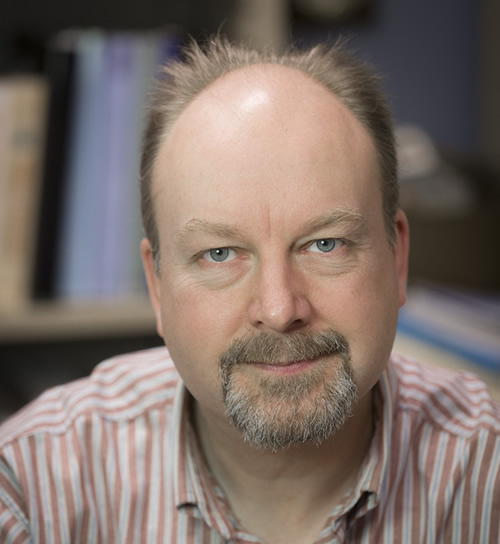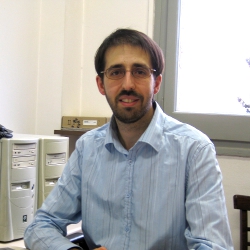Alex M. Clark
 Founder of Molecular Materials Informatics, which is dedicated to bringing cheminformatics to modern computing platforms (mobile, web, cloud, etc.). Outspoken advocate for increased awareness of chemical information technology by experimental chemists, in order to make the results of their experiments usable by machine learning algorithms, as well as other expert humans. Card-carrying former experimental chemist, software engineer from a young age, with many years spent creating software for computer-aided drug design. For more information, see LinkedIn Profile and Cheminformatics 2.0 blog.
Founder of Molecular Materials Informatics, which is dedicated to bringing cheminformatics to modern computing platforms (mobile, web, cloud, etc.). Outspoken advocate for increased awareness of chemical information technology by experimental chemists, in order to make the results of their experiments usable by machine learning algorithms, as well as other expert humans. Card-carrying former experimental chemist, software engineer from a young age, with many years spent creating software for computer-aided drug design. For more information, see LinkedIn Profile and Cheminformatics 2.0 blog.



 Leah McEwen is the Programmatic Coordinator for the Edna McConnell Clark Physical Sciences eLibrary and the Chemistry Librarian at Cornell University. Her background is in biochemistry and library science and she is responsible for library resources and specialized services supporting chemistry in all fields and science and technology studies at Cornell. She has contributed to and served in advisory capacity for a number of information resources including the ACS Style Guide, the ACS CPT Guidelines for Bachelor’s Degree Programs, Cornell’s VIVO, and CAS’ SciFinder. She is an active member of the Chemical Information Division of the American Chemical Society, most recently as Secretary as well as Program Chair, addressing a wide range of topical interests from open access to advanced training and education to intellectual property and licensing to data- and text-mining. She is also a member of the ACS Joint Board-Council Committee on Publications, the adjoining Subcommittee on Copyright and the Chemical & Engineering News Editorial Board.
Leah McEwen is the Programmatic Coordinator for the Edna McConnell Clark Physical Sciences eLibrary and the Chemistry Librarian at Cornell University. Her background is in biochemistry and library science and she is responsible for library resources and specialized services supporting chemistry in all fields and science and technology studies at Cornell. She has contributed to and served in advisory capacity for a number of information resources including the ACS Style Guide, the ACS CPT Guidelines for Bachelor’s Degree Programs, Cornell’s VIVO, and CAS’ SciFinder. She is an active member of the Chemical Information Division of the American Chemical Society, most recently as Secretary as well as Program Chair, addressing a wide range of topical interests from open access to advanced training and education to intellectual property and licensing to data- and text-mining. She is also a member of the ACS Joint Board-Council Committee on Publications, the adjoining Subcommittee on Copyright and the Chemical & Engineering News Editorial Board.  I am an Associate Professor Chemistry trained as an analytical chemist with expertise in flow analysis methodology and instrumentation. Over the last 15 years I have morphed into a cheminformatician working on research projects to develop data standards (e.g. the Analytical Information Markup Language - AnIML, Common Standard for eXchange – CSX, Experiment Markup Language - ExptML), electronic laboratory notebooks (e.g. the Eureka Research Workbench), scientific ontologies (e.g. the Chemical Analysis Ontology – CAO), and scientific data representation. My current projects include: REST API development for NIST-IUPAC solubility datasets, chemical property data extraction and annotation from PDF files, scientific data framework (SciDF) development, and the Chemical Analysis Metadata Platform (ChAMP). I have expertise in XML and Markup Languages, XSLT/XPATH/SVG, RDF, JSON/JSON-LD, PHP, Javascript, MySQL, SPARQL, CSS, CMS’s, REST interfaces, API design and construction, schema design, ontology development and Fedora-Commons.
I am an Associate Professor Chemistry trained as an analytical chemist with expertise in flow analysis methodology and instrumentation. Over the last 15 years I have morphed into a cheminformatician working on research projects to develop data standards (e.g. the Analytical Information Markup Language - AnIML, Common Standard for eXchange – CSX, Experiment Markup Language - ExptML), electronic laboratory notebooks (e.g. the Eureka Research Workbench), scientific ontologies (e.g. the Chemical Analysis Ontology – CAO), and scientific data representation. My current projects include: REST API development for NIST-IUPAC solubility datasets, chemical property data extraction and annotation from PDF files, scientific data framework (SciDF) development, and the Chemical Analysis Metadata Platform (ChAMP). I have expertise in XML and Markup Languages, XSLT/XPATH/SVG, RDF, JSON/JSON-LD, PHP, Javascript, MySQL, SPARQL, CSS, CMS’s, REST interfaces, API design and construction, schema design, ontology development and Fedora-Commons. Jordi Cuadros is an Associate Professor at IQS Universitat Ramon Llull (Barcelona, Spain) where he teaches introductory courses of programming to students in Chemistry, Chemical Engineering, Industrial Engineering and Biotechnology degrees. He holds a PhD in chemistry and a second degree in Education and his research expands over the intersection between physical sciences, computers, education and data analytics. He has been involved in developing simulations for learning chemistry and physics and currently tries to place some light on the learning that takes place when students use interactive and open-ended applications.
Jordi Cuadros is an Associate Professor at IQS Universitat Ramon Llull (Barcelona, Spain) where he teaches introductory courses of programming to students in Chemistry, Chemical Engineering, Industrial Engineering and Biotechnology degrees. He holds a PhD in chemistry and a second degree in Education and his research expands over the intersection between physical sciences, computers, education and data analytics. He has been involved in developing simulations for learning chemistry and physics and currently tries to place some light on the learning that takes place when students use interactive and open-ended applications.